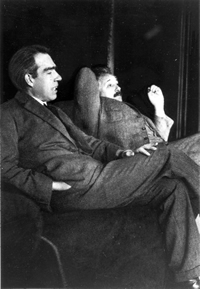I believe that scientific knowledge has fractal properties, that no matter
how much we learn, whatever is left, however small it may seem, is just as
infinitely complex as the whole was to start with. That, I think,
is the secret of the universe.
I believe that scientific knowledge has fractal properties, that no matter
how much we learn, whatever is left, however small it may seem, is just as
infinitely complex as the whole was to start with. That, I think,
is the secret of the universe.
Goethe opposed the use of the microscope, since he believed that
what cannot be seen with the naked eye should not be seen, and that
what is hidden from us is hidden for a purpose. In this, Goethe was a
scandal among scientists, whose first, firm, and necessary principle is
that if something can be done, than it should be done.
I think that modern physics has definitely decided in favour of Plato. In
fact, the smallest units of matter are not physical objects in the ordinary
sense; they are forms, ideas which can be expressed unambiguously only
in mathematical language.
A mathematician is someone who can take a cup of coffee
and turn it into a theory.
We think of the number 5 as applying to appropriate groups of any
entities whatsoever - to five fishes, five children, ...
We are merely thinking of those relationships between those two groups
which are entirely independent of the individual essences of any of the
members of either group. This is a very remarkable feat of abstraction;
and it must have taken ages for the human race to rise to it.
To my mind there must be, at the bottom of it all, not an equation, but an utterly simple idea.
And to me that idea, when we finally discover it, will be so compelling, so inevitable, that we
will say to one another, Oh, how beautiful. How could it have been otherwise?
It still remains an incredible mystery: Why is there something instead of nothing?
Humans ... stumble along blindly on the road to nowhere - a paved highway which they themselves
bulldoze and make smooth so that they can get faster to the big empty hole which they'll find at
the end, waiting to swallow them up. It's a quick comfortable super-highway, but I know where it
leads to. I've seen it. I've been there in my vision and it makes me shudder to think about it.
It appears that the seventeenth-century German mathematician and philosopher Leibniz was familiar
with the Hua-yen school of Buddhist thought. Some have argued that this was why he proposed that
the universe is constituted out of fundamental entities he called monads, each of which
contains a reflection of the whole universe. What is significant is that Leibniz also gave the world
integral calculus, and it was integral calculus that enabled Dennis Gabor to invent the hologram.
Every virtue is a means between 2 extremes, each of which is a vice.
What we observe is not nature itself, but nature exposed to our method of questioning.
The universe is made of stories, not atoms.
When a new idea is showing promise, it needs to be refuted.
At the age of 11, I began Euclid, with my brother as my tutor. This was one of the great events
of my life, as dazzling as first love. I had not imagined there was anything so delicious in the world.
Newton was of the most fearful, cautious, and suspicious temper that I have ever known.
